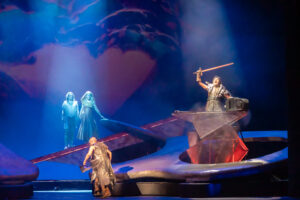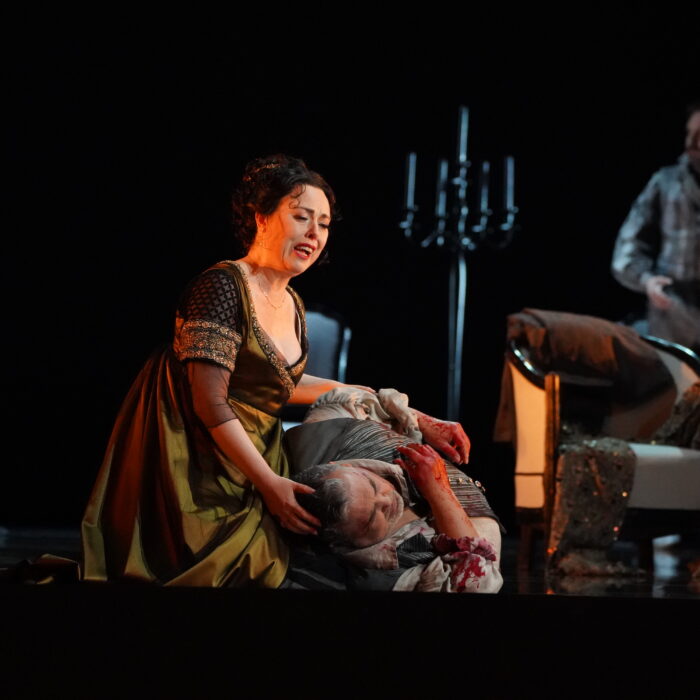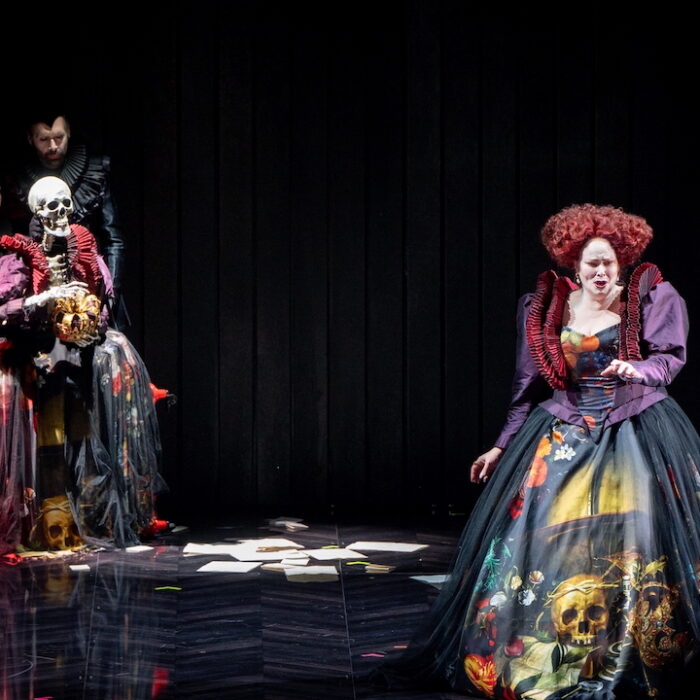
Sofia Opera & Ballet 2023 Review: Siegfried
Kartaloff’s Strong Direction And Trinks’ Dramatically Sensitive Musical Direction Keep New Ring Cycle On Course
By Alan Neilson(Photo: Sofia Opera & Ballet)
After a very successful performance of “Die Walküre,” expectations were running high for Sofia Opera & Ballet’s production of “Siegfried,” the third opera in the company’s latest Ring Cycle. Unfortunately, however, it fell short of the standards set by the two preceding operas, “Das Rheingold” and “Die Walküre,” and was dwarfed by the excellent presentation of “Götterdämmerung” that followed.
An Unconvincing Siegfried
The fundamental problem centered on the casting of Kostadin Andreev as Siegfried. He has a colorful palette and a flexible voice that he is able to project well, but overall, he was unconvincing. As the evening progressed, the demands of the role started to take their toll and his stamina started to drain away, causing the vocal line to become increasingly insecure. By the final scene of Act three, the line was awkward and jagged. It grated against the sound of the orchestra. One could feel the effort he was putting into his singing, which unfortunately made things worse as his inflections jumped out crudely from the line. Additionally, he did not have the necessary swagger to be a hero. One expects heroes to be confident, unconcerned about potential obstacles, and fearless as they stride forward. However, the hero had all but disappeared by the end of Act two. It all sounded a little too uncomfortable to be able to fully enjoy, and so the opera was brought to a conclusion on what was, unfortunately, a low note.
Andreev, however, is not without a voice. There were scenes throughout the evening in which his singing was very expressive, which enabled him to dominate the stage. In Act one, for example, he was fairly successful throughout. The scene in which he forges Notung was very convincing. His singing was secure and confident, and he was able to move the voice freely as he forcefully hammered the sword into shape. Even in his confrontation with the Wanderer in Act three, he was able to hold the vocal line and imbue it with a degree of confidence. His problems were essentially ones of consistency and stamina.
Andreev’s problems inevitably affected other members of the cast as they interacted with him, which was most clearly evident in the opera’s final scene with Brünnhilde, played by soprano Radostina Nikolaeva. Although she produced a solid performance in which her ability to sustain the line while pushing the voice without any loss of control was particularly impressive, her impact was inevitably dulled. As Andreev struggled, the fresh-sounding Nikolaeva grew stronger, and the imbalance between the singers was accentuated, undermining any sense of frisson between them. His outpouring of love, for example, “Dich lieb’ ich: o liebst mich du,” was so unconvincing that no matter how she had responded, it would not have sounded appropriate.
A Strong Supporting Cast
Bass Krisztian Cser, playing the Wanderer, gave an assured performance that captured his inner strength and reflective wisdom, underscored by a calm resignation resulting from his realization that the gods’ time was drawing to a close. As Alberich provoked and goaded him in Act two, he brilliantly stamped his authority on the scene by projecting a real sense of calm that brought out the significance of their changed relationship. They were no longer pursuing the same goal! The god had now clearly accepted the destiny he himself had unwittingly put into motion, while the dwarf was stuck, chasing the ring and its power. Cser’s voice was very well suited to the role. He possesses a full-bodied, colorful, lyrical voice with a pleasing tone across the range, which he used skillfully to bring out the depth of his character.
In “Das Rheingold,” the tenor Krassimir Dinev gave a good account of himself as the downtrodden dwarf Mime. In “Siegfried,” however, the role requires far more from the singer, and Dinev did not disappoint, producing a wonderfully acted and well-sung performance that brought his character fully to life, successfully capturing his cowardice, ambition, and vicious and duplicitous nature. On stage for the entirety of Act one, which was around 80 minutes, his energy never dipped. He was always on the move and vocally strong throughout. His phrasing was expressive and sensitive to the dramatic demands of the narrative. The relationship he established with Andreev was actually one of the production’s high points. While his Mime was sniveling and ingratiating, Andreev’s Siegfried was openly contemptuous and demanding. Their voices complemented each other successfully, and their relationship had a believable fluidity to it.
The dwarf, Alberich, wandered on and off the stage throughout much of the evening so as to keep an eye on what was going on. He was always lurking in corners or behind scenery. His mind forever on the ring. Once again, the role fell to baritone Plamen Dimitrov, who had played him so successfully in “Das Rheingold,” and he continued in the same vein, producing another forceful, clearly defined presentation in which his ability to carry the full meaning of the text in his singing impressed. In his confrontation with the Wanderer, he ensured that every line was carefully moulded with subtle dynamic and emotional inflections. The tone of the voice was carefully altered to project the precise meaning of the words. It was a very well-constructed scene with two very good singers.
Mezzo-soprano Vesela Yaneva once again produced a beautifully sung performance in the role of Erda. On this occasion, however, she added a more distant quality to the voice that gave it an eternal quality, which was absent in “Das Rheingold.”
After her antics on the trampoline as Woglinde in “Das Rheingold” and riding around the stage on the model of a full-sized horse as Helmwige in “Die Walküre,” soprano Ayla Dobreva this time took to the skies as the Wood-bird. Jumping from a high trapeze on elasticated wires, she bounced up and down, while tweeting out her lines. She performed the task remarkably well, and her bright, high-lying soprano created a good impression.
The Giant, Fafner, who had transformed himself into a dragon, was sung by bass Petar Buchkov. He did not appear in person, but projected his voice via speakers, which created a rumbling, hollow sound that actually sounded as if it could have come from a large beast.
The musical side of the production was once again overseen by conductor Constantin Trinks, who continued his excellent work in developing the Orchestra of Sofia Opera and Ballet’s performance and understanding of the Wagnerian repertoire. Building on a splendid reading of “Die Walküre,” Trinks kept up the momentum with a strong presentation in which his management of the tensions and attention to the dramatic arc impressed. Given that the orchestra was slightly understrength owing to the relatively small pit, he also did a fine job of balancing the sections to create engaging textures, although occasionally the strings did appear to lose out to some enthusiastic playing from the brass section. The attention he gave to the singers ensured that they were never overwhelmed, although he was unable to do much to compensate for the wayward singing in the final scene.
Kartaloff’s Beautiful Stage Tableaux
The director, Plamen Kartaloff, continued with the basic stage design that he had been successfully developing in “Das Rheingold” and “Die Walküre,” which promoted a clear, streamlined reading of the narrative with a strongly defined and pleasing aesthetic. Scenes were neatly crafted to present visually attractive tableaux, centered around three ring-like mobile structures that were used as platforms on or around which the singers were positioned. Andrej Hajdinjak’s atmospheric and bold lighting designs, alongside Ivan Lipchev’s imaginative, mainly abstract images, projected onto the back of the stage and provided strong support.
He also continued to allow figures from other operas in the Ring Cycle to appear in the background as memories or as spirits watching over events, thereby cleverly creating threads that linked the work together, such as when Siegmund and Sieglinde watched on as Siegfried triumphantly forged Notung. During the prelude, he used the empty space to remind the audience of the background to the opera’s plot by having an exhausted Sieglinde enter the stage and give birth to a child, which Mime quickly removed and rushed off into the darkness. It was a nice idea, one that immediately dragged the audience into the heart of the drama.
Throughout the entire cycle, there was rarely a scene that Kartaloff miscalculated. But, the Wanderer’s confrontation with Mime bordered on the brink. The Wanderer appeared from the rear of the stage with a large globe, onto which he placed his hand in a suitably authoritative pose. It was, however, a large rubber ball. When he started to bounce it and at one point, even kick it around, it gave the appearance of descending into a comedy sketch. No such problem existed, however, in the scene in which Siegfried slays Fafner. This was superbly done with the stage bathed in a blood-red light, the dragon’s ferocious head rose up from inside one of the rings that made up the scenery, upon which Siegfried flung himself, before the two of them then disappeared down into the cave. Such scenes can often be awkward, but this was done very well.
There was so much to enjoy in this production of “Siegfried,” but unfortunately, Andreev’s quickly dissipating stamina severely undermined the success of the final scene, and this will probably be one of the features that will be most clearly remembered. In his defense, however, it is only right that I point out that he sang well for large parts of the evening and that at the final curtain he received a very positive reception from the audience.



